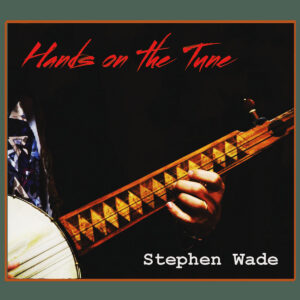by: Rick Landers

The guy had a down home storytelling style, talking about a painter named, Slappy, while filling in parts with shuffle dancing and playing on his old-time banjo. He was remarkable and you knew you’d just seen a major talent early on, in what would become a long informative entertainment career. And that’s exactly what happened. Wade is not only an entertainer, a songwriter and charming storyteller, but he is also a deep well historian of traditional roots music.
Recently, we connected and he sent me a copy of his recent album, Hands on the Tune, a collection of banjo tunes coupled with bits and pieces of stories about the tunes’ backgrounds, characters and historical anecdotes that attract our interest, and most often make us smile.
Immediately, although recorded in front of live concert audiences, you feel like you’re in Wade’s living room or you’re sitting around a campfire with him as he comforts you with his crackerjack banjo style and his native down home tongue. The guy’s got style, and soon he delivers with his exceptional grasp of his banjo and knowledge of the songs he presents. You can almost hear the crackling of a fireplace while imagining a backyard clutch of logs stacked to the fuel night air with smoke, shadows and light.
But, before you play the music, I urge you to read through the insert he’s placed in the CD jewel case, to catch the drift of Stephen Wade, his love of songwriting and songsters of American traditional roots music, that cascade down through the ages from Africa, Europe, and the British Isles. Many are hand me down songs that wade through the rivers and walk the crooked roads of Appalachia, songs that Stephen embraces and fully adores.
His chosen twenty songs on Hands on the Tune (Patuxent Music (c) 2023), are for the most part traditional enchanting selections. And Stephen doesn’t save the best for last or the last for best. Each song’s history and rough hewn integrity, get their proper acknowledgement and tribute.
Straight up, Stephen rolls into a tune by the late Uncle Jimmy Thompson that’s called, “Uncle Jimmy’s Favorites”. For those tarnished by the thought of banjo playing, this tune is a fine entry to enjoy and appreciate old time banjo music at its best. Back in the day this music and some of the instruments were considered by some to be devilish things, with some instruments exiled to sheds and barns, not to be left inside Gospel driven homes.
As a side note, some of those ostracized instruments in the barn would have rattlesnake rattles put inside their sound holes, if the instrument had to two holes then some would place their rattle inside the left hole, to ward of wood eating bugs.
Quite pretty is “Lost Gander” articulately played and sweet in its own wandering, before Stephen steps on to the love lament “Sourwood Mountain,” where he sings the version by Frank Proffitt and Doc Hopkins. The song’s origins are considered to be of Appalachian origin, though there are some New England versions. With its clever farm animal lyrics and nonsensical refrain, it’s a well-loved song played by many. Stephen’s vocal phrasing and his stretching of some lyrics make his choices more fun to sing along with. And the lyrics are both clever and playful,
“Big dog barks and the little one bites”
“Spanish Fandango/Snowdrop” a traditional tune revised often since 1838, clicks along the tracks lightly, on this wide-spread beginner roots tune. The chord structure can be found in other old tunes, that have stood the test of time, although often critiqued for their open tuned simplicity. Still, listen to Stephen Wade’s plucking and you’ll appreciate it, and Kirk McGee’s song as delightful and one where the original “Spanish Fandango” is well worth exploring its contributory history and musical offshoots.
Charlie Butler’s version of “Diamond Joe” is a beautiful love lament, with an introduction by Stephen who tells us about the tune’s history. It’s a tune that’s been covered by many we know, including: Harry Belafonte, Bob Dylan, Bessie Smith, Jack Elliot and many more. A nice add by Wade’s “Big Charlie Butler” version of the tune, and one that many roots music lovers will be familiar.
“Home Sweet Home”is an old traditional tune, originally penned by John Howard Payne, with music composed by Sir Henry Bishop, and based on an opera called Clari or The Maiden of Milan. The popular song was recorded in 1961 by Earl Scruggs and Lester Flatt, and Stephen chose their version to present on Hands on the Tune, and it’s a great choice. And in similar fashion as Flatt’s dobro playing, Stephen paired himself on banjo with Dobro Hall of Famer, Russ Hooper, on dobro.
Next up, Wade plays a gourd banjo offering us what he calls, “a really old sound,” describing the old roots sound of the tune that’s gruff and gnarly, a rough hewn banjo frail, that skips hard across its path, where we can imagine heavy cloggers wearing out floor planks or kicking up dust with spirited abandonment. Following is a medley, “Elzick’s Farewell,” that’s as pretty as can be, with Stephen picking a delightful stretch of banjo playfulness. Then a two-song medley, Buck Dancer’s Choice and Needlecase plucks along nicely, charming us in their straightforward styles.

“Wabash Blues” is an upbeat piece and we can imagine a whole body of country folk clapping along to the beat, with more energized friends rising up to the occasion to join in the fun, and trample the boards with splendid good humor.

Stephen gets into the spirit of traditional roots music again on “Market Square” where he sings an intro before beginning his banjo roll in, then his vocal and axe carry the tune along its lyrical way about an imprisoned man and his love left behind.
Wade intersperses many of his songs with a bit of banter, offering up historical perspectives about banjoists, storytellers and in “Minister in the River” (medley) he even tells a tale of Davy Crockett and a seemingly mad banjo player; a clever and humorous story conjured by Mr. Wade. “Chatham Hill Serenade” is a brief sparkling instrumental tune, while it leads into “Worthy of Estimation,” “Arkansas Traveler,” and “Feather Bed,” that all shine with Stephen’s masterful playing.
While Wade is quick-witted on his banjo on “Last Payday at Coal Creek,” and uptempo, the reverse blues vocal has a slower trajectory with a story of a poor boy coal miner “gone,” a long way from home, at a time when a coal mine explosion busted Coal Creek mine, and when many miners became freight hopping hobos leaving town to find new jobs..
“Hand in Hand,” is a beautifully rendered tribute instrumental for Stephen’s friend, blues player and grave digger, John Jackson, and a song Stephen played for John at his bedside when he passed away. It’s a sweet tune composed by Tony Ellis, a past member of Bill Monroe’s Bluegrass Boys, and a tender piece for a loved friend who grasped the end of one’s days, both philosophically and stoically.
A couple of medley’s follow, “Roll on the Ground/Grub Springs”, along with “Reno Factory/Brown Skin Blues,” the former a sprightly presented tune, the latter (“Reno Factory”) with some slide ornamenting the eclectic style of the Piedmont blues and other musical inclinations of earlier versions. At once, the final medley sounds more contemporary than many of the songs on Hands on the Tune.
Stephen Wade wraps up his fine homespun style album, with “Sugar Hill,” a spunky banjo piece with plenty of rolls. It’s a bit of a quirky tune, referenced here by Wade, recorded by John “Dad” Crockett (Brunswick – 1929), about Sugar Hill, a reference to a “red light District” where you can get anything you want.
If you want to get your eye knocked out, if you want to get your fill,
If you want to get your eye knocked out, go on to Sugar Hill
With twenty tunes on his 2023 release, Stephen Wade, generously offers his fans more than a fistful of dollars on this platter. His song selections will take you back to the days when life was tougher, sometimes meaner, while he gifts us with a full measure of clever lyrics, hard tack clogging and some of the most honorable and delightful banjo picking you’ll ever hear. And as many know, as much as Stephen’s a masterful storyteller, musician and a respected historian, he’s also a gent with an imagination and passion for his craft and for those who came before. Wade draws us into a cultured community, fundamentally driven by the hard muscled labor of coal mining, farming, railroad workers and their families, expressed by old time musicians who played the Devil’s music, scorned by some, delighted by many.
5 STAR RATING!